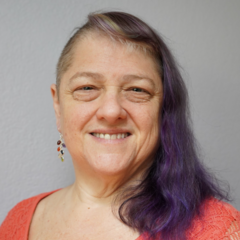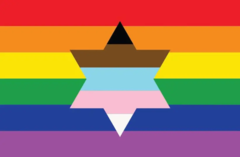Empathy for the Outsider
06/23/2023 10:00:49 AM

D'var Torah, June 23, 2023
In honor of Pride month, I want to talk about a verse of Torah whose message is close to my heart, Exodus, chapter 22, verse 21, from Parshat Mishpatim. It talks about a specific mitzvah:
You shall neither vex a stranger, nor oppress him: for you were strangers in the land of Egypt.
Let’s think about this in the context of Pride, which celebrates and supports lesbian, gay, bisexual, transgender, queer, questioning, intersex and asexual people. These words describe people who are strangers, living their lives outside of the heterosexual, cis-gendered society that is the established “norm” in this country, and around the world. We are outsiders based on inherent qualities of our personhood:
-
Whom we love and partner with
-
How we express and feel our gender
-
How our bodies are structured
-
The level of our sexual desire and expression
This Torah verse means a lot to me because I’ve spent a lot of my life as an outsider, a stranger. Some examples:
-
I grew up Jewish in a neighborhood of Catholics. I had a strong Jewish identity, but outside of my extended family, I didn’t have much Jewish community.
-
I grew up a fat kid surrounded by disapproval. In my childhood my worth was constantly measured by how much weight I had gained or lost.
Even though this, and my Jewishness, aren’t directly related to pride, they are aspects of myself that kept me from feeling “normal”; I was the outsider.
-
Then I came out as a lesbian at age 18, into a society that, at the time, had never heard of Ellen DeGeneres or the L Word or marriage equality. I’ve lived my entire adult life as an outsider, the earlier part of it in secrecy and fear.
- Both of my children are gender non-conforming: one is transgender female-to-male, and one is transgender non-binary. I’ve had to be their advocate in school, and stand by them as they moved into adulthood. I thank my lucky stars that they live in the Bay Area, probably the best place for them, but even here I fear for their safety at times.
And now, although I feel comfortable with my Judaism, my size, and my sexual orientation, I often still feel like an outsider. I’m unsure how much of my private life as a polyamorous, kinky, queer person I can share with others. Saying these words here, in what I feel is a safe space, is scary for me, and I wonder if the empathy I’ve been talking about is present here.
The Torah teaches that strangers are vulnerable to discrimination and exploitation, so they especially need the protection of the community. Specifically, strangers
-
Must not be abused
-
Must not be wronged in judgment by judges
-
Must not be cheated or taken advantage of in contracts or employment
-
Must not taunted about being strangers
When we look at what happens to LGBTQ people in this country and around the world, we see violations of this commandment everywhere:
-
We are jailed and even executed in many places around the world.
-
Lesbian, gay, bisexual, and especially transgender people are disproportionately impacted by violent victimizations. According to a UCLA study, LGBTQ people are nearly four times more likely than non-LGBTQ people to be victims of violent crime. My wife and I have both experienced violence targeted at us being lesbians, as have some of my family and many of my friends in the community. And lest you think we live in a bubble, much of this has taken place here in the Bay Area.
-
Studies have shown that over 1/4 of LGBTQ youth have experienced homelessness, been kicked out of their family homes, or have run away due to lack of support or threats of, or actual, violence at home.
-
In a large percentage of our states, we can get fired, removed from housing, and denied education and access to public services. Some states are now denying medical care for transgender people, banning books, and limiting free speech around LGBTQ topics. Frankly, this makes me feel like I am a prisoner here in the Bay Area. You see, if I was offered an amazing job in Florida or Texas, or even Bakersfield, my family would not be safe if we moved there, so I don’t have the freedom to consider such opportunities. I also recently heard about two separate lesbian couples who were on driving trips. In one case, they decided they had to masquerade as sisters in order to be safe. In the other case they felt they had to adjust their travel plans to not drive through areas that would not be safe for them to be out.
So what does it take to make real change to stop this kind of intolerance? One key is getting to know people who are different from us. Studies have shown that people who know an LGBTQ person are more likely to think it is important to protect our rights and be supportive.
The Torah refers to “knowing the ‘nefesh’ of the stranger”. Nefesh is the soul, the seat of one’s deepest feelings: it is the sum of all of the thoughts, feelings, experiences and values of the individual. To know the nefesh of a stranger is to be truly empathetic.
I think many of us feel empathy for outsiders, for people like me and my family. But I often get asked “What can I DO?”. The answer is, we can be allies, using our privilege to further the cause of Tikkun Olam, making the world a better place for strangers.
-
We can educate ourselves on the proper, respectful vocabulary to refer to those different from us.
-
When we hear about news items related to LGBTQ people, we can speak supportively. Someone overhearing us will then know that we are allies, and possibly someone who respects us might change their mind when they hear our opinion.
-
Conversely, when we hear people speaking in a hostile or unsupportive way, we can use our privilege to speak up. Remember that saying about “who will speak for me”?
-
We can participate in politics. We can vote for laws and judges and sheriffs and representatives who are supportive of the LGBTQ community. That UCLA survey I referred to earlier found that 86% of LGBTQ youth said that recent politics have negatively impacted their well-being.
If you are like me, an outsider, I hope that you feel safe here at PTS, and know that I, and so many of us in our congregation, are here to support you.
I’d like to close with the words of Jewish philosopher Hermann Cohen “This law of shielding the alien from all wrong is of vital significance in the history of religion. With it, true Religion begins. The alien was to be protected, not because he was a member of one’s family, clan, religious community, or people; but because he was a human being. In the alien, therefore, man discovered the idea of humanity.”
When we open our hearts and minds to strangers, we discover our own humanity.
Shabbat Shalom.






